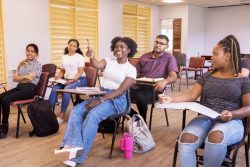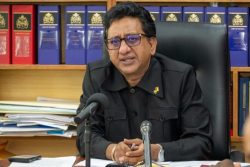VOTING IN U.S. ELECTIONS Installment Sixty-Three
U.S. citizens who are residing in Guyana can exercise their right to vote in the upcoming November 4, 2008 Federal election that will determine the next President of the United States.
But in order to have your decision count, you need to act now to request your absentee ballot. It is important to have your voice heard and as the 2000 Presidential election showed, absentee ballots can make a difference.
Q. Who is permitted to vote absentee?
Generally, all U.S. citizens age 18 years or older who are or will be residing outside the United States during an election period are eligible to vote absentee in any election for Federal office. This includes primary, run-off, and special elections that occur throughout the year, as well as the upcoming general election for U.S. President and other Federal officials to be held on November 4, 2008. Some states in the United States allow overseas voters to vote in elections for state and local offices, and for state and local referendums in addition to voting for those running for Federal office.
The absentee voting process permits U.S. citizens who will be away from their local polling places on election day, to register, request a ballot, and vote
through the mail. Absentee voters should request absentee ballots at least 60 days before the election to allow enough transit time for their ballots to reach their postal address overseas.
Q. What is the process for obtaining an absentee ballot?
A U.S. citizen who is outside of the United States must first register to vote in his or her state of legal residence. In order to register to vote citizen must carefully complete a Federal Post Card Application (FPCA) and submit it to the proper election official in the state where he or she intends to vote. Each state has its own specific instructions and deadlines for when the FPCA must be received.
What if I have never registered to vote or voted in the past?
Voting eligibility and residency requirements are determined by the various U.S. states, and are available on-line at http://fvap.gov/pubs/vag.html. Your “legal state of residence” for voting purposes is the state where you last resided immediately prior to departure from the United States. Voting rights extend to overseas citizens even though they may no longer own property or have other ties to their last state of residence, and even if their intent to return to that state may be uncertain. For those who have never resided in the United States, sixteen states, to date, allow eligible U.S. citizens to register where a parent would be eligible to vote.
Where does one get a FPCA?
The official U.S. Government website for overseas absentee voting assistance is the Federal Voting Assistance Program (FVAP) website www.fvap.gov.
***
“Ask the Consul” is a fortnightly column from the U.S. Embassy answering questions about U.S. immigration law and visa issues. If you have a general question about visa policy please email it to us at AskGeorge@state.gov. We select questions each week and publish the answers in Stabroek News and on our website at http://georgetown.usembassy.gov/guyana/ask_con.html. For more information about visas please see http://www.unitedstatesvisas.gov or http://georgetown.usembassy.gov/.
Other than the questions we select, we DO NOT respond to questions sent to Ask the Consul. Please contact the visa inquiries unit (email visageorge@state.gov or call 225-7965 between 8 am- 12 pm and 1 pm- 4 pm Monday through Friday) if you have questions about a specific case.









